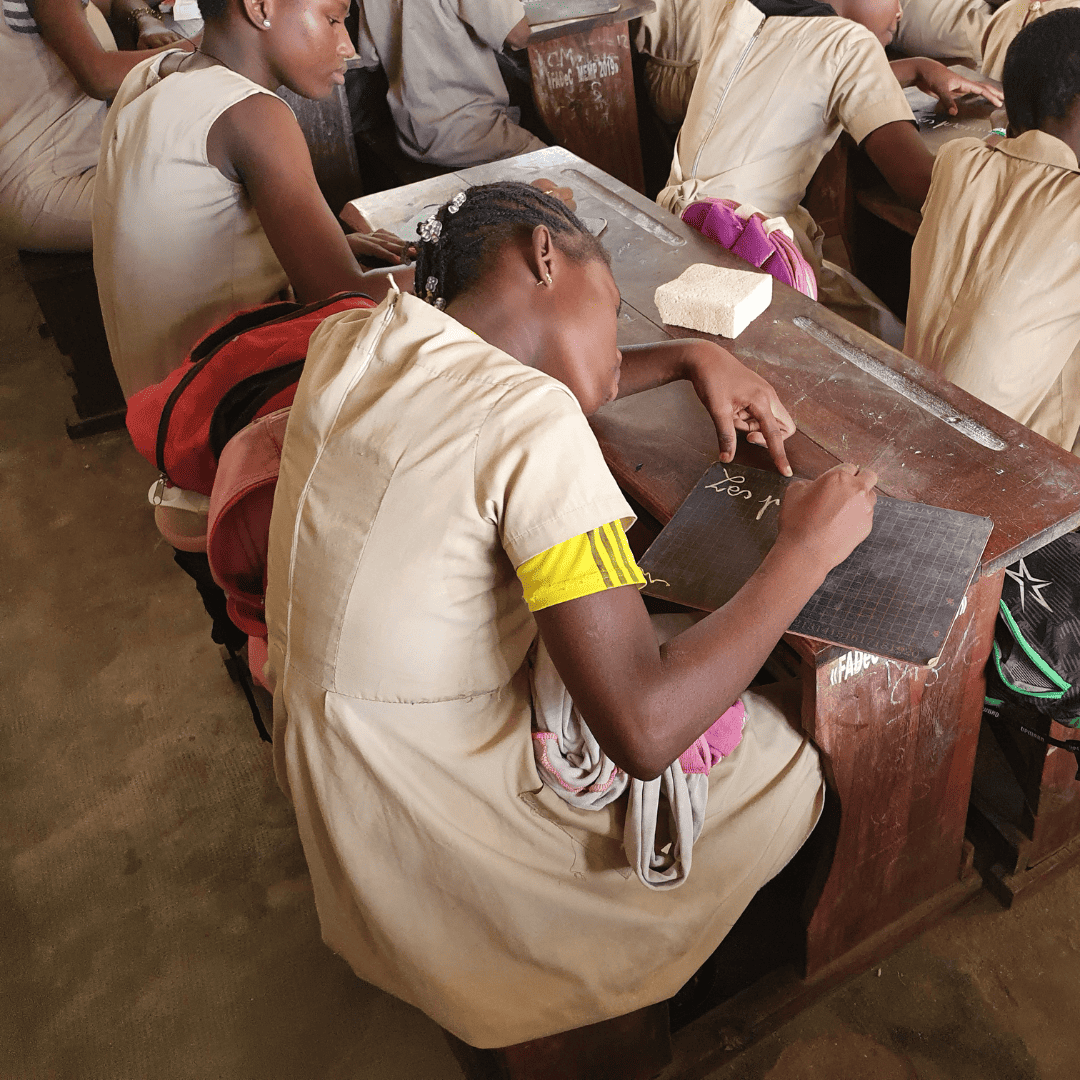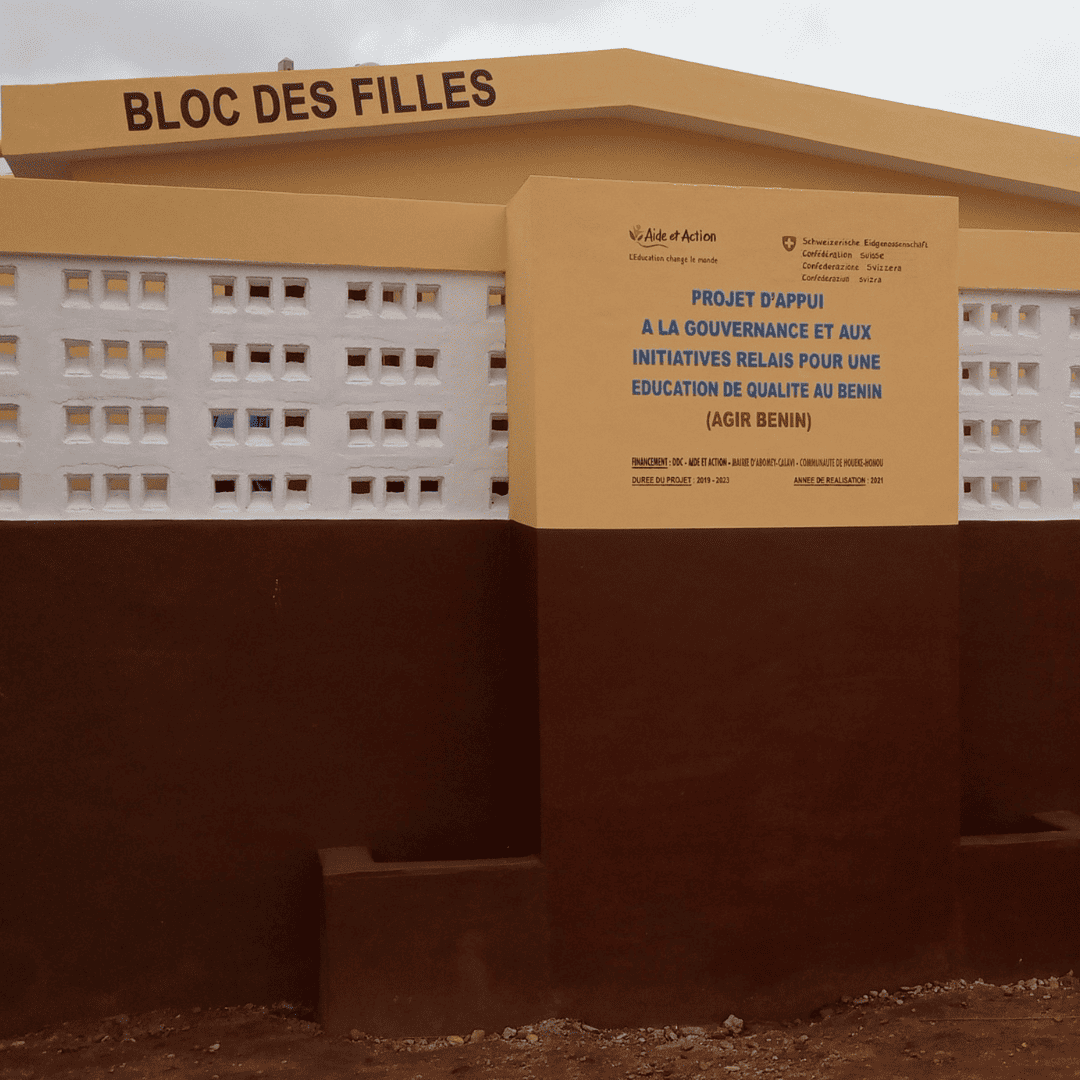Menstruation, still a taboo subject!
Menstruation in the community is a taboo subject in Benin. Many girls who experience their first menstrual period are often faced with difficulties:
- Poor preparation, with little or no information on the subject.
- Ignorance of appropriate behaviour and gestures to adopt when menstruation occurs.
According to a the United Nations Educational, Scientific and Cultural Organisation, in sub-Saharan Africa, 1 in 10 girls do not go to school during their menstrual cycle, which is equivalent to a loss of 20 % of school time per year. What's more, when they start their menstrual cycle, they may drop out of school altogether. Menstrual management becomes a constraint and a problem for them due to the lack of information, adequate infrastructures and easy-to-use hygiene products.
Menstruation, a taboo with disastrous consequences for girls' schooling
 A survey was carried out in the area where the Support project for governance and relay initiatives for quality education (AGIR-BENIN) funded by the Swiss Agency for Development and Cooperation (SDC) and implemented by the Action Education/Plan International Benin consortium.
A survey was carried out in the area where the Support project for governance and relay initiatives for quality education (AGIR-BENIN) funded by the Swiss Agency for Development and Cooperation (SDC) and implemented by the Action Education/Plan International Benin consortium.
The results speak for themselves:
- Girls are often stressed in class during their menstrual period and do not attend lessons;
- Most of them miss school during this period and stay at home at least 4 days a month because they don't know how to look after themselves;
- And difficulties in managing menstruation are often the reason why many girls drop out of school.
Better management of menstruation to prevent girls from missing school and dropping out
The AGIR project provides a response to this situation by supporting pupils, and in particular girls most at risk of dropping out, by putting in place a package of appropriate services. Ninety resource persons, one per school, have been identified and trained in menstrual hygiene management (knowledge and control of the menstrual cycle, hygiene around menstruation, correct use of sanitary towels, consequences of menstruation, etc.).
821 girls of menstruating age have been identified in the project schools and trained with the support of resource persons. They are monitored by resource persons to ensure good hygiene during menstruation. Pupils' parents, particularly mothers, have been involved and receive the same support/advice as the girls.
Here are a few examples of Action Education's work on menstrual hygiene in communities and schools.
Student testimonials
Carène GBOZO, CM2 pupil at Zoungoudo/A public primary school in Ouidah
"I've been menstruating for two years. I didn't like talking about it because I was ashamed. My classmates and I were identified by the resource person with the help of the Action Education facilitator to get information and advice on how to manage my periods. I'm now more at ease in class. We have received a lot of advice from the facilitator and the teacher, and if one of us has a period at school, we are no longer afraid or ashamed because the teacher now helps us to manage it. I would like to thank the NGO Action Education for this great initiative.
Natacha MENAKPO, a CM2 pupil at Tokoli public primary school in the commune of Tori Bossito.
"I started menstruating last year and the very first time was at home. That day my mum was the first person to know. She told me that I was now a woman and that I shouldn't have sex with boys. At school, I got a lot more advice from the teacher and the activity leader. They told me how to wash the pieces of loincloth I use and how to maintain good personal hygiene. This activity on managing menstrual hygiene, initiated by the NGO Action Education, has enabled me to learn how to behave during menstruation and to avoid missing classes during this period.
Testimonials from teachers, parents and resource people
Raymond DANTON, President of the Gonfandji school Parents' Association (Zé commune)
"I would like to thank the NGO Action Education for its work in my community, especially the activities specifically aimed at girls, with the involvement of female teachers in the process. Menstruation is a normal process in the lives of our daughters, sisters and mothers. And development cannot take place in their absence, given their dual roles as educator and mother. Today's daughter is tomorrow's mother. There's no need to isolate her during these periods, as certain rites and customs prescribe. She can go about her daily business as normal if she is able to do so.
It's true that menstruation brings with it another form of hygiene specific to this period that women go through. It's up to the community to raise their awareness so that they take better care of themselves and their studies.
Yvonne ZANNOU, member of the Cercle de Réflexion des Femmes (CRF)
"The presence of Action Education is really beneficial for our community. It's an opportunity for our children, especially the girls, to go further in their studies. This is the first time that an NGO has worked for girls' health through menstrual hygiene in Zinvié. As a mother and member of the Cercle de Réflexion des Femmes, I raise girls' awareness of the first periods, which generally appear between the ages of 8 and 16, and sometimes after the age of 17. On average, they last from 2 to 5 days. Girls often experience discomfort such as abdominal cramps, pain, bloating, vomiting, headaches, dizziness and sore breasts. I advise them to avoid sugary meals, beans and bean products. Menstrual blood is not impure.
During periods, cleanliness and hygiene are important to avoid any risk of infection or unpleasant odours. To relieve menstrual pain, I ask girls to drink lots of water and eat lots of vegetables.
Thank you to the NGO Action Education and the Swiss Cooperation for this initiative to ensure that more girls succeed in their studies so that they can participate in the development of their country.
AMADJAKO Clémentine, mother of a pupil at EPP Zounto (Commune de Zè)
"Women are menstruating. A woman who doesn't menstruate can't give birth. Menstruation is particularly important because it has a marked effect on girls' quality of life during and after puberty, and especially on their performance at school. Good menstrual hygiene is fundamental to girls' health and well-being. The presenter told us today that this year, girls will be taught about menstruation, which is really commendable!
In the classroom, girls don't really take care of themselves properly. A big thank you to the NGO Aide et Action, which through the project "Appui à la Gouvernance et aux Initiatives Relais pour une éducation de qualité au Bénin (AGIR) Bénin" (Support for Governance and Relay Initiatives for Quality Education in Benin) is working for the well-being of our children, especially our girls. "
Moudjahidathou ABOU, mother of a pupil at Golo-Djibgé school (Abomey-Calavi commune)
Our girls in schools lack information and are not well prepared to manage their menstrual periods. Some girls are absent or even drop out of classes because of menstruation. I would like to thank Action Education and the Swiss Cooperation for the attention given to the older girls in CE2, CM1 and CM2 classes who have already had their first menstrual period. They are the ones who often drop out of classes to learn how to manage their periods. It's true that it's a bit tricky to talk about this subject with children, especially our daughters at home. But with the information I've received, I've made a commitment to accompany my daughters and to be a sister they can confide in. Thank you to the AGIR Benin project!







